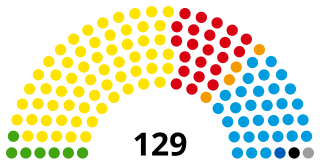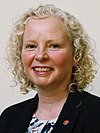
The legislatures of the United Kingdom are derived from a number of different sources. The Parliament of the United Kingdom is the supreme legislative body for the United Kingdom and the British overseas territories with Scotland, Wales and Northern Ireland each having their own devolved legislatures. Each of the three major jurisdictions of the United Kingdom has its own laws and legal system.

The Scottish Parliament is the unicameral legislature of Scotland. Located in the Holyrood area of the capital city, Edinburgh, it is frequently referred to by the metonym Holyrood. The Parliament is a democratically elected body comprising 129 members known as Members of the Scottish Parliament (MSPs), elected for five-year terms under the regionalised form of additional member system (MMP): 73 MSPs represent individual geographical constituencies elected by the plurality (first-past-the-post) system, while a further 56 are returned as list members from eight additional member regions. Each region elects seven party-list MSPs. Each region elects 15 to 17 MSPs in total. The most recent general election to the Parliament was held on 6 May 2021, with the Scottish National Party winning a plurality.
The Charity Commission for England and Wales is a non-ministerial department of His Majesty's Government that regulates registered charities in England and Wales and maintains the Central Register of Charities. Its counterparts in Scotland and Northern Ireland are the Office of the Scottish Charity Regulator and the Charity Commission for Northern Ireland.

The first minister of Scotland, formally known as the First Minister and Keeper of the Scottish Seal, is the head of government of Scotland and the leader of the Scottish Government, the executive branch of the devolved government of Scotland. The first minister also serves as the keeper of the Great Seal of Scotland whilst in office.

The presiding officer of the Scottish Parliament is the presiding officer and speaker of the Scottish Parliament. The office of presiding officer was established by the Scotland Act 1998, and the elected presiding officer is a member of the Scottish Parliament who is elected by the Scottish Parliament by means of an exhaustive ballot, and is ex officio the head of the Scottish Parliamentary Corporate Body. The presiding officer is considered a figurehead of the Scottish Parliament and has an office in Queensberry House.

The High Court of Justiciary is the supreme criminal court in Scotland. The High Court is both a trial court and a court of appeal. As a trial court, the High Court sits on circuit at Parliament House or in the adjacent former Sheriff Court building in the Old Town in Edinburgh, or in dedicated buildings in Glasgow and Aberdeen. The High Court sometimes sits in various smaller towns in Scotland, where it uses the local sheriff court building. As an appeal court, the High Court sits only in Edinburgh. On one occasion the High Court of Justiciary sat outside Scotland, at Zeist in the Netherlands during the Pan Am Flight 103 bombing trial, as the Scottish Court in the Netherlands. At Zeist the High Court sat both as a trial court, and an appeal court for the initial appeal by Abdelbaset al-Megrahi.

The National Audit Office (NAO) is an independent Parliamentary body in the United Kingdom which is responsible for auditing central government departments, government agencies and non-departmental public bodies. The NAO also carries out value for money (VFM) audits into the administration of public policy.

Michael Stephen Matheson is a Scottish politician who has been a Member of the Scottish Parliament (MSP) since 1999, first representing the Central Scotland region and, since 2007, the Falkirk West constituency. Matheson previously served in the Scottish government as Cabinet Secretary for NHS Recovery, Health and Social Care from 2023 to 2024, Cabinet Secretary for Net Zero, Energy and Transport from 2018 to 2023, and Cabinet Secretary for Justice from 2014 to 2018.

The Scottish Parliament Building is the home of the Scottish Parliament at Holyrood, within the UNESCO World Heritage Site in central Edinburgh. Construction of the building commenced in June 1999 and the Members of the Scottish Parliament (MSPs) held their first debate in the new building on 7 September 2004. The formal opening by Queen Elizabeth II took place on 9 October 2004. Enric Miralles, the Catalan architect who designed the building, died before its completion.

Public bodies of the Scottish Government are organisations that are funded by the Scottish Government. They form a tightly meshed network of executive and advisory non-departmental public bodies ("quangoes"); tribunals; and nationalised industries. Such public bodies are distinct from executive agencies of the Scottish Government, as unlike them they are not considered to be part of the Government and staff of public bodies are not civil servants, although executive agencies are listed in the Scottish Government's directory of national public bodies alongside other public bodies.
Andrew Paton Welsh was a Scottish politician. He was the Scottish National Party Member of Parliament (MP) for South Angus from October 1974 to 1979, East Angus from 1987 to 1997, and Angus from 1997 to 2001. He was the Member of the Scottish Parliament (MSP) for the constituency of Angus from 1999 to 2011.
Audit Scotland is an independent public body responsible for auditing most of Scotland's public organisations. These include the Scottish Government, local councils and NHS Scotland.

Members of the Scottish Parliament (MSPs) are entitled to a salary, and where applicable, expenses and allowances.

The Senedd Commission is the corporate body for the Senedd of Wales. The commission is responsible for ensuring the property, staff and services are provided for the Senedd. The commission consists of the Llywydd of the Senedd and four members from different political parties, who each have different portfolios of work. The commission is supported by staff in the Commission and Support Service. Prior to 2020, the body was known as the National Assembly for Wales Commission.
The Scottish Human Rights Commission (SHRC) is the national human rights institution for Scotland. It was established by the Scottish Commission for Human Rights Act and started its work in 2008. The Commission is independent of the Scottish and UK Government, and of Parliament.

Scottish Parliament committees are small groups of Members of the Scottish Parliament (MSPs) who meet on a regular basis to scrutinise the work of the Scottish Government, conduct inquiries into subjects within their remit and examine legislation. Much of the everyday work of the Scottish Parliament is done by these committees.
The commissioner for ethical standards in public life in Scotland is an independent commissioner in Scotland with the responsibility for investigating complaints about Members of the Scottish Parliament, councillors of the 32 Councils of Scotland, and board members of Scottish public bodies. The commissioner also monitors the appointment of members of specified public bodies in Scotland by the Scottish Ministers.

An act of the Scottish Parliament is primary legislation made by the Scottish Parliament. The power to create acts was conferred to the Parliament by section 28 of the Scotland Act 1998 following the successful 1997 referendum on devolution.

The Scottish Parliamentary Standards Commissioner Act 2002 is legislation that introduced arrangements for complaints against any Member of the Scottish Parliament to be investigated independently. It established the Scottish Parliamentary Standards Commissioner, who was given powers to summon witnesses and compel evidence.
The Michael Matheson iPad scandal, commonly known as iPadgate, emerged as a significant controversy in Scottish politics in late 2023. Michael Matheson, then serving as Cabinet Secretary for NHS Recovery, Health and Social Care in the government of Humza Yousaf, was revealed to have incurred nearly £11,000 in roaming charges after taking a Scottish Parliament iPad on a family holiday to Morocco. Matheson initially attempted to claim the charges as a parliamentary expense, but later admitted that the iPad had been used by his sons to stream football matches, and agreed to personally pay back the full cost of the data roaming bill. Following an investigation by the Scottish Parliament Corporate Body, Matheson resigned as Health Secretary in February 2024. Matheson was subsequently banned from Holyrood for 27 days and had his salary withdrawn for 54 days, the heaviest sanction ever awarded to an MSP.















